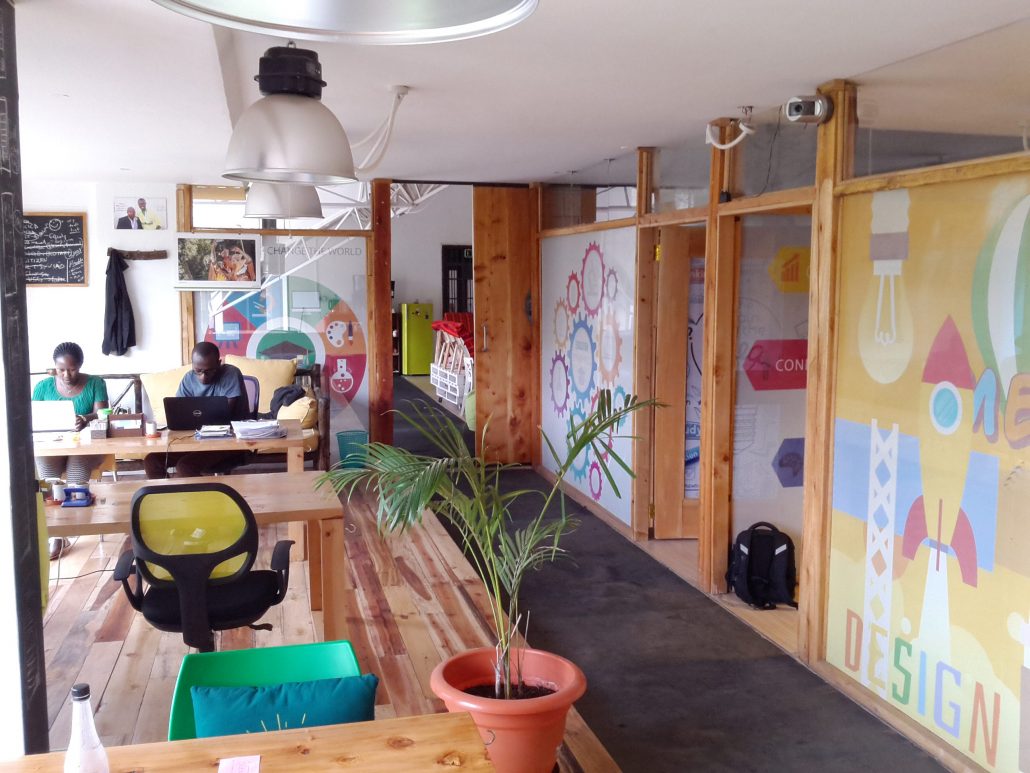
Kytabu’s colorful Nairobi office: the startup needed several years until it could afford such a space
Digital entrepreneurship is on the rise across Africa. There is no question that the number of technology startups and the number of organizations trying to support them has multiplied in recent years.
Many have taken this rise of activity to indicate a fundamental and promising shift. Already, The Next Africa has been proclaimed, and policymakers argue that entrepreneurship is the logical next step within Africa’s digital transformation. In the words of Bitange Ndemo and Tim Weiss, the “digital entrepreneurship revolution in Africa” consists of “an inspiring generation of entrepreneurs… working actively to bring the benefits of the digital age to every citizen and organization in Africa,” with “disruption, creativity, and innovation [as] the central tenets of a new era.”
For me as a qualitative researcher, this begets the question: how does this revolution look like from up-close, in different parts of Africa? What are the lived experiences of the people at the frontlines?
Following on from my dissertation on Africa’s innovation hubs, I have now begun work on the digital entrepreneurship pillar of the Geonet project. In the first round of fieldwork, I covered Nairobi, Lagos, and Kigali.
In this first blog post, I report a few observations about our core unit of analysis: the African digital enterprise. The following impressions are generalized from across 40 interviews with digital entrepreneurs (we will publish more nuanced accounts soon).
In those three cities, a significant number of entrepreneurs are succeeding at running sustainable operations. What is more, entrepreneurs are trying out innovative business models that are different from those we know from the Global North.
On the other hand, with a few exceptions, the famed hockey stick growth and scaling potential of digital enterprises remained an aspiration: most businesses grew slowly and stayed small, often ranging between three and twenty employees.
Interestingly, most startups relied on interactions with local customers and information, despite the potential of “the digital” to bridge distances. This led many enterprises to focus on business-to-business because it was easier to generate revenue in this segment: individual African consumers of digital software were hardly ever willing to pay. Moreover, it was key for digital enterprises to offer low prices and a “good enough” product that doesn’t necessarily have to achieve international standards. They also needed to provide customers with an immediate, tangible benefit.
As a result, financial success and sustainability hardly ever came quickly or easily. It appeared that most businesses needed about three to five years to find ways to consistently generate sufficient revenue. This was because entrepreneurs tended to start off with unrealistic expectations about market potentials and the ease of monetization: issues like poor digital payments infrastructures or lacking willingness to pay often prohibited them from making money. Enterprises often needed to tweak their business models, identify more specific and reachable target markets, establish themselves among a customer base, and find workarounds to payments challenges and other barriers.
“The digital” has therefore created a degree of economic opportunity in Africa which did not exist ten years ago. Today, it is very much possible to build a small sustainable digital enterprise in most African countries. What counts is entrepreneurial persistence, technological adaptation, local knowledge, and customer interactions (enabled by spatial proximity). Yet, it’s also clear that this entrepreneurial process is less glamorous than what success stories and transformation rhetoric might lead us to believe. The bottom line appears to be that digital entrepreneurship is not easy money, that it takes time, and that it is highly embedded with existing markets, institutions, infrastructure, and technologies.
Ours is a qualitative comparative study, so we can speak mainly to processes and patterns but not to the size of the digital sector. Still, if we extrapolate from the enterprise to the national or continent-wide level, these findings bring up some difficult questions.
Given the mentioned scope and scale limitations for enterprises, how much employment and wealth can Africa’s home-grown digital economies really create in the foreseeable future?
Based on our data, I wouldn’t rule out that African digital entrepreneurship could be an important economic contributor in the future. Yet, it’s also clear that some of the transformation discourse is overblown and premature. Given the importance of learning and adaptation, maybe we should not speak of an African digital entrepreneurship revolution, but rather of an evolution, which will take time and hard work to materialize in the form of widespread wealth and opportunity.
Related work on innovation hubs, discourses, and BPO:
Friederici, N. (2016, October). Innovation Hubs in Africa: Assemblers of Technology Entrepreneurs. Dissertation, Oxford, UK: Oxford Internet Institute, University of Oxford. Retrieved from https://ora.ox.ac.uk/objects/uuid:2e5c9248-15b4-450a-958a-0ce87cf6e263.
Friederici, N., Ojanperä, S., & Graham, M. (2017). The Impact of Connectivity in Africa: Grand Visions and the Mirage of Inclusive Digital Development. Electronic Journal of Information Systems in Developing Countries, 79(2), 1–20.
Graham, M. (2015). Contradictory Connectivity: Spatial Imaginaries and Technomediated Positionalities in Kenya’s Outsourcing Sector. Environment and Planning A, 47(4), 867–883.
Mann, L., & Graham, M. (2016). The Domestic Turn: Business Process Outsourcing and the Growing Automation of Kenyan Organisations. The Journal of Development Studies, 52(4), 530–548.
Mann, L., Graham, M., & Friederici, N. (2014). The Internet and Business Process Outsourcing in East Africa: Value Chains and Networks of Connectivity-Based Enterprises in Kenya and Rwanda. Oxford, UK: Oxford Internet Institute, University of Oxford. Retrieved from https://www.oii.ox.ac.uk/archive/downloads/publications/The_Internet_and_Business_Process_Outsourcing_in_East_Africa.pdf.
Cross-posted at http://cii.oii.ox.ac.uk/2017/06/02/africas-digital-revolution-an-enterprise-perspective/